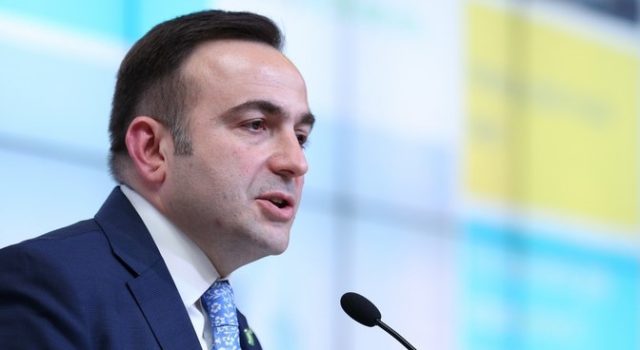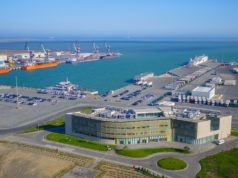Bakhtiyar Aslanbayli, bp Vice President Middle East and Caspian, Communications and Advocacy, outlines bp’s newly-announced strategy and what it means for Azerbaijan

We all saw yesterday (4 July) bp introduce its new strategy. Is this part of what you announced back in February ?
Yes, it is. In February bp announced its new purpose, net zero ambition
and aims, and its determination to reimagine energy and reinvent bp. What
we announced yesterday is the strategy that sets out how bp expects to
deliver its ambition.
What is this strategy about?
Well, as I said, our new purpose and aims are focused on reimagining
energy for people and our planet, and our new ambition is to achieve net
zero by 2050 or sooner, and help the world get there too. And to achieve
this we said we would have to reinvent bp into a leaner, faster-moving,
lower-carbon company.
So, the new strategy is our next big step in this transformation journey for bp.
It is our strategy for a decade of delivery towards our net zero
ambition.
It will pivot bp from an International Oil Company primarily focused on producing resources to an Integrated Energy Company delivering solutions for customers.
As our CEO Bernard Looney said “bp has been an international oil
company for over a century – defined by two core commodities produced by
two core businesses. Now we are pivoting to become an integrated energy
company – from IOC to IEC. From a company driven by the production of
resources to one that’s focused on delivering energy solutions for
customers.”
We need to start doing this now and we intend to move quickly. Within a
decade we expect to be a very different kind of energy company. This is
because we believe the energy transition is accelerating and that
customers—nations, industrial sectors, companies large and small, and
consumers—want bespoke, increasingly low carbon solutions to their
energy needs.
And to meet those changing demands and head towards net zero ourselves, we expect bp to become a more diversified energy company by 2030, by:
- Making a 20-fold increase in developed net renewable generating
capacity–to 50GW. - And a 10-fold increase in low carbon energy investments – to around
$5 billion per annum. - Doubling consumer interactions to 20 million a day.
- Lowering, over time, oil and gas production by at least one million
barrels of oil equivalent a day—or 40%. - Focusing oil and gas exploration on our high-performing existing
basins and not entering new countries.
Does this mean you will gradually scale down your business in Azerbaijan and the Caspian region?
No, it does not. Oil and gas will get smaller over time but will remain an
important part of bp. What is changing is that bp will no longer be predominantly a hydrocarbon company. It will be an integrated energy
company – with oil and gas one part of a more balanced portfolio. As
Bernard said “hydrocarbons will be integral to bp for decades to come.
They are a core part of our strategy. In fact, they enable the strategy. They
fuel our transformation.”
So, we intend to diversify our company into different forms of energy – renewables, bio, hydrogen but oil and gas will still continue to be core to bp
in the countries where we have commitments to the nations. Part of that
commitment is that in 2030, we still expect to be investing globally around
$9 billion into our oil and gas business per year.
What does this mean specifically for Azerbaijan?
In Azerbaijan, we have the responsibility to explore and develop the
country’s major oil and gas resources. We remain committed to that
responsibility which is very important to us.
We will continue to be successful in everything we do in this country by
maintaining the industry-leading position of our oil and gas business here in terms of quality. So, we are absolutely committed to continuing to operate a safe, reliable and resilient oil and gas business in Azerbaijan and
generate revenues to the nation and our shareholders.
To conclude, I want to say we have been present in Azerbaijan and the
Caspian region for around three decades investing in production,
transportation and exploration. We will continue our oil and gas business
here including investment in exploration in decades to come while we also
will continue to look for opportunities to expand our relationship with
Azerbaijan and the region on a range of other areas of our long-term
energy partnership.
Could you also update us on your current activities?
We are still, as are all other businesses in the world, involved in responding
to the challenges facing us in the COVID-19-caused difficult environment.
However, I am proud to say that we continue our core business activities –
production and exports from ACG and Shah Deniz – safely, reliably and
efficiently. In addition:
• We continue to drill our first exploration well on the Shafag-Asiman block
and intend to complete it by the end of this year;
• We will start drilling the first exploration well in shallow water Absheron as
soon as the upgrade of the drilling rig is completed. We hope that this will
also be possible by the end of this year.
• We completed the planned 3D seismic survey programme on D230
earlier this year, and now we are conducting the processing and
interpretation of the acquired data.
• We continue the construction of ACE (Azeri Central East) – the new
platform for Azeri-Chirag-Gunashli. Despite the impacts of the pandemic on
the construction activities, our plans for the first ACE oil in 2023 remain
unchanged.







